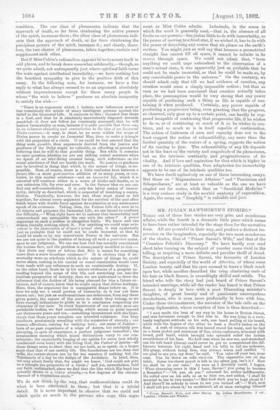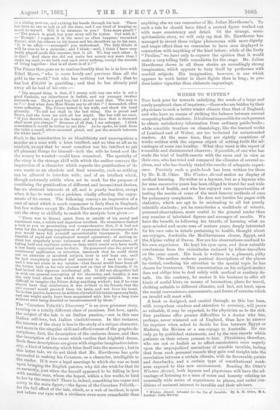MR. JULIAN HAWTHORNE'S STORIES.* THREE out of these four stories
are very grim and murderous affairs, while the fourth is a dramatic little piece which seems to have been rather intended for the stage than for the narrative form. All are powerful in their way, and produce a distinct im-
pression on the imagination, especially the two most murderous of the stories, that of "Prince Saroni's Wife," and that of the "Countess Felicities Discovery." We have hardly ever read short tales turning on the subject of murder more vivid in the telling, or inspiring a more definite and peculiar thrill of dread. The description of Prince Saroni, the favourite of London Society, and especially of the world of Attac7i6e, of whom some London beauty said that his eyes seemed to leave a black mark upon her, while another described the crisp clustering curls of his hair as black flames, is exceedingly skilful and subtle. The• friend who tells the story had just heard of Prince Saroni's intended marriage, while all the reader has heard is that Prince Saroni is deeply in love with a poor Dissenting minister's daughter, of great beauty and of passionate unscrupulous devotedness, who is even more profoundly in love with him. Under these circumstances, the narrator of the tale calls on the young diplomatist, whose reception of him is thus described :— "I now made the beat of my way to his house in Bruton Street, and was fortunate enough to find him in, He was lying in a reck- lessly negligent attitude on his sofa, one hand pulling at his beard, while with the fingers of the other he beat a Devil's tattoo on the floor. A sash of crimson silk Was bound round his waist, and he had on a loose jacket and waistcoat of fine, white cashmere, trimmed with broad, gold braid, which brought into splendid relief the Indian swarthiness of his face. He half rose when he saw me, and stretched out his left hand (Saroni could never be got to comprehend the dif- ference between his right hand and his left) to bid me welcome. His grasp, without being firm, was always warm and cordial. I am glad to see you, my dear,' he said. 'You take off your hat, your coat. You lie down on sofa vis4-vis. The cigarettes are on the table. Some ice-claret punch is left in the silver jug, isn't it Now we shall be at our ease.' As soon as I decently could, I began. What charming news is this I hear, Saroni ! you going to become a Benedict ?'—' Oh yes, oh yes 1' returned he, rather indifferently. He rolled over on his sofa so as to face me, and added, I shall be married to her in two weeks.'—' But how dark you've kept about it I And there'll be nobody in town to see you turned off.'—' Well, now I shall tell you about it,' he exclaimed, all at once swinging himself * Prince Saroni's Wilo, and other Stories. 13y Julian Ilawthorno. 2 vol . London: Chatto and Windua. to a sitting posture, and rubbing his hands through his hair. 'There has been no one to talk to all the time, and I am tired of keeping so much to myself, Will it be tiresome to you P Take more punch!' —' The punch is good, but your story will be better. Out with it.' —` Humph ! I suppose it is the same as often happens,' remarked Saroni, with his elbows on his knees and his shoulders up to his ears. It is an affair—arranged ! you understand. The lady thinks it will be nice to be a princess ; and I think—well, I think I have very badly played cards this summer, that is all. We buy each other : it is that! And since she did not make her money any more than I make my rank, so we both cost each other nothing, except the trouble of living together : that is all there is of it !' "
The Prince then goes on to confess frankly that he is in love with Ethel Moore, who is more lovely and precious than all the gold in the world," but who has nothing but herself ; that he has lost £50,000 in gambling ; and that he has already paid away all he had of his own :—
"The second thing is that, if I marry with any one who is not a good Catholic, my inheritance is forfeit, and my younger brother succeeds me. Heja a good boy, but I do not want that. The way is so !'—' And what does Miss Moore say to all this ?' I demanded, after some reflection, The Prince halted in his walk, and shook his head gloomily. To tell her shall be the last thing. She is proud and fierce, and she loves me with all her might. She has told me once, "If you deceive me, I go in the water, and my face that is drowned shall meet you always Because of all that, I am unhappy. I think sometimes it would be better to use this.' As he spoke, he took from the table a small, silver-mounted pistol, and put the muzzle between his white teeth," Such is the introduction to as bloodthirsty and unscrupulous a murder as a man with a keen intellect, and no idea at all as to conduct, except that he must somehow use his intellect to get all pleasant things for himself—both, the wife he loved and the the money he wanted—could have conceived. The specialty of the story is the strange skill with which the author conveys the impression of a character which regards the gratification of its
own wants as an absolute and final necessity, such as nothing can be allowed to interfere with ; and of an intellect which, though extremely subtle when set to work for the purpose of combining the gratification of different and inconsistent desires, has no abstract interests at all, and is purely inactive, except when it has to work out a problem vitally affecting the enjoy- ments of its owner. The following conveys an impression of a cast of mind which is much commoner in Italy than in England, but few writers except Mr. Julian Hawthorne could have worked out the story so skilfully to match the analysis here given :—
"There was in &mai, apart from or outside of his social and emotional man, a subtle and sagacious intellect. He sometimes darted a look at you so penetrating and comprehensive that, if it had not been for the laughing roguishness of expression that accompanied it, you would have felt yourself uncomfortably transparent. Ile was capable of rapid and complicated mental operations ; of making in- stant but singularly acute estimates of motives and characters ; of taking bold and confident action on data which would only have made a less finely organised man hesitate. He possessed also the power of continuous application or attention, insomuch that he could think out an abstruse or involved subject, hour in and hour out, until he had completely resolved and mastered it. I used to fancy— and I was not alone in my opinion--that Sanaa would have been all the better, both on his own account and on that of his friends, if he had lacked this vigorous intellectual gift. It did not altogether full in with our general conception of his character, and, besides, it was the only trait about him which was not entirely amiable. It was difficult to imagine the Prince doing anything wicked ; but if he ever should have that misfortune, it was evident to his friends that the evil counsel would proceed from his brain, and not from his heart. To do him justice, however, he seldom obtruded his brains upon anybody, and one might easily have been acquainted with him for a long time without ever being startled or inconvenienced by them."
The " Countess Velicitk's Discovery" is an even grimmer story, turning on a totally different class of passions. But here, again,
• the subject of the tale is an Italian passion,—not in this case Italian self-love, but Italian vindictiveness. In this instance, the interest of the story is less in the study of a unique character, and more in the singular skill and effectiveness of the graphic de- scriptions, first, the description of the ominous dream, and then the description of the event which verifies that frightful dream. Both these descriptions are given with singular imaginative lama- , sity, a kind of intensity which bites itself into the memory ; but in this latter tale, we do not think that Mr. Hawthorne has quite stnheceeded in making his Countess, as a character, intelligible to
e reader. If it were a legal marriage to which she was so bent
Pon bringing the English painter, why did she wish for that tie so.teharnestly, just when she herself appeared to be falling in love Ntvi another man, whom she hoped, within a few weeks, to bind o h er by the same tie? There is, indeed, something too vague and imisty in the main figure,—the figure of the Countess Felicia,— or the full effect of the tale, which, as a web of incident, is spun out before our eyes with a vividness even more remarkable than
anything else we can remember of Mr. Julian Hawthorne's. To such a tale he should have fitted a central figure worked out with more consistency and detail. Of the strange, semi- spiritualistic story, we will only say that Mr. Hawthorne has managed to invest these vulgar phenomena with more dignity and tragic effect than we remember to have seen displayed in connection with anything of the kind before ; while of the lively "Pauline," we have only to express the opinion that it would make a very telling little comedietta for the stage. Mr. Julian. Hawthorne shows in all these stories an exceedingly strong imagination, which appears to busy itself by preference with morbid subjects. His imagination, however, is one which appears to work better in short flights than in long ; to pro- duce better vignettes than elaborate engravings.































 Previous page
Previous page